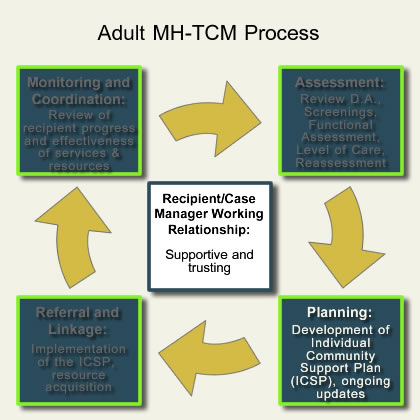Indicators on What Is Affect In Mental Health You Should Know
Currently, more than 33% of countries designate less than 1% of their overall health budget plans to mental health, with another 33% costs simply 1% of their budgets on psychological health. A minimal variety of medications is suffi cient Drug Rehab Center to treat the majority of mental illness. About 25% of countries, however, do not have the 3 most commonly prescribed substance abuse to deal with schizophrenia, anxiety and epilepsy at the main healthcare level.
The bad typically bear the higher concern of mental illness, both in terms of the risk in having a mental illness and the absence of access to treatment. Constant direct exposure to significantly stressful occasions, hazardous living conditions, exploitation, and bad health in basic all contribute to the greater vulnerability of the poor.
The report states new understanding can have an incredible impact on how people, societies and the public health neighborhood deal with psychological conditions. We now understand that large psychological institutions no longer represent the very best alternative for patients and families. Such organizations result in a loss of social abilities, extreme limitation, human rights offenses, dependency, and lowered opportunities for rehabilitation.

In the face of this understanding, a failure to act will show an absence of commitment to address mental health issues," said Dr Benedetto Saraceno, Director of WHO's Mental Health and Substance Dependence department. The policy instructions have never been so clear, states WHO. Federal governments who are just starting to attend to mental health will require to set concerns.
WHO's message is that every country, no matter what its resource constraints, can do something to enhance the mental health of its people. What it requires is the guts and the dedication to take the needed steps. The report is part of a year-long campaign on psychological health. For the very first time, multiple events at WHO including its leading report, technical discussions at the World Health Assembly and World Health Day, have actually all concentrated on one topic psychological health.
Mental illness can impact lots of areas of trainees' lives, decreasing their quality of life, scholastic achievement, physical health, and satisfaction with the college experience, and adversely impacting relationships with family and friends members. These concerns can likewise have long-lasting consequences for trainees, impacting their future employment, earning possible, and general health.
The How Does Homelessness Affect Mental Health Statements
2 Research suggests that anxiety is related to lower grade point averages, and that co-occurring depression and anxiety can increase this association. 2 Anxiety has actually also been linked to leaving of school. 2 Numerous college students report that psychological health problems disrupt their research studies. On the American College Health Association 2015 survey, college trainees identified the following mental health issues as adversely affecting their scholastic efficiency within the last 12 months:3 Stress (30% of trainees) Stress and anxiety (22%) Sleep troubles (20%) Anxiety (14%) Peers, family members, professors, and staff might be personally affected out of issue for these trainees.
Suicide and suicidal thoughts can impact the larger school community. Roomies, peers, professors, and staff likewise experience profound sorrow over student suicides and suicidal habits. Campuses feel the problem when students with mental health problems do inadequately on course work and leave of school. Colleges and universities should be prepared to attend to the mental effect of suicides on other students, as well as on teachers and personnel.
The community is adversely affected when trainees are not able to complete their degrees and contribute valuable abilities in a competitive task market (how does lack of sleep affect mental health). One research study discovered that five percent of students do not complete their education due to psychiatric disorders and estimated that 4. 29 million people would have graduated from college had they not been experiencing such conditions.
E., Golberstein, E., & Hefner, J. L. (2007 ). Prevalence and correlates of depression, stress and anxiety, and suicidality amongst university trainees. American Journal of Orthopsychiatry, 77( 4 ), 534542. Eisenberg, D., Downs, M., & Golberstein, S. (2009 ). Stigma and help-seeking for psychological health among university student. Treatment Research Study and Review, 66( 5 ), 522541. American College Health Association.
National College Health Assessment II: Spring 2015 reference group executive summary. Hanover, MD: Author. Recovered from http://www. acha-ncha. org/reports _ ACHA-NCHAII. html. Meilman, P. W., & Hall, T. M. (2006 ). After-effects of awful occasions: The development http://travisawip724.lowescouponn.com/not-known-details-about-how-does-diabetes-affect-mental-health and use of neighborhood assistance meetings on a university campus. Journal of American College Health, 54( 6 ), 382384.
C., Foster, C. L., Saunders, W. B., & Stang, P. E. (1995 ). Social effects of psychiatric conditions, I: Educational achievement. American Journal of Psychiatry, 152( 7 ), 10261032.
4 Simple Techniques For How Does Technology Affect Our Mental Health
Psychological health problems impact 19% of the adult population, 46% of teenagers and 13% of kids each year. People having problem with their mental health might be in your family, live next door, teach your kids, work in the next cubicle or being in the exact same church seat. Nevertheless, only half of those impacted get treatment, often since of the preconception attached to mental health.
A mental health problem is a that triggers disruptions in thinking, behavior, energy or emotion that make it difficult to manage the regular needs of life. Research is beginning to discover the complex reasons for these illness which can include genetics, brain chemistry, brain structure, experiencing injury and/or having another medical condition, like heart disease.
State of mind conditions, such as depression and bipolar anxiety, impact almost 10% of grownups each year and are identified by difficulties in controling one's mood. Although the general perception of mental health problem has improved over the past years, studies reveal that preconception against mental illness is still powerful, mostly due to media stereotypes and illiteracy, which individuals tend to attach negative stigmas to psychological health conditions at a far greater rate than to other illness and disabilities, such as cancer, diabetes or cardiovascular disease.

Preconception and false information can seem like overwhelming challenges for somebody Addiction Treatment Delray who is dealing with a mental health condition. Here a few effective things you can do to help: eliminates a considerable barrier to effectively handling their illness. Having individuals see you as a specific and not as your disease can make the most significant difference for somebody who is fighting with their psychological health.
permits us to offer handy support to those impacted in our families and neighborhoods. Terrific sources for mental health news and details consist of: Jean Holthaus, LMSW, LISW has been offering outpatient therapy services since 1995 when she made her Masters of Social Work degree from the University of Iowa. She has actually worked for Pine Rest since 1997.
Psychological, neurological and compound utilize conditions (MNS) prevail, highly disabling, and associated with considerable early mortality. The human, social and economic toll enforced by lack of attention to MNS throughout the world is substantial. It is estimated that a minimum of 10 percent of the world's population is impacted, which 20 percent of kids and teenagers struggle with some kind of mental condition.
